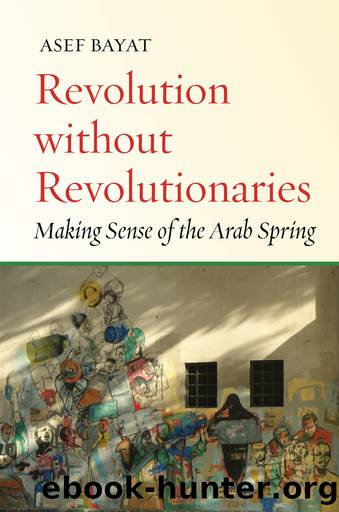Revolution Without Revolutionaries by Bayat Asef

Author:Bayat, Asef [Bayat, Asef]
Language: eng
Format: epub
Publisher: Stanford University Press
Published: 2017-06-15T00:00:00+00:00
8
Half Revolution, No Revolution
In 2011, the Arab uprisings were celebrated as world-changing events that would redefine the spirit of our political times. The astonishing spread of these mass uprisings, followed soon after by the Occupy protests, left observers in little doubt that they were witnessing an unprecedented phenomenonâsomething totally new, open-ended, a movement without a name, revolutions that heralded a novel path to emancipation. According to Alain Badiou, Tahrir Square and all the activities that took place thereâfighting, barricading, debating, camping, cooking, and caring for the woundedâconstituted the âcommunism of movement.â Posited as an alternative to the conventional liberal-democratic and authoritarian state, this was a universal concept that heralded a new way of doing politicsâa true revolution. For Slavoj Žižek, only these âuniversalâ political happenings, without hegemonic organizations, charismatic leadership, or party apparatuses, could create what he called the âmiracle of Tahrir.â For Hardt and Negri, the Arab Spring, Europeâs indignado protests, and Occupy Wall Street expressed the longing of the multitude for a âreal democracy,â a different kind of polity that might supplant the hopeless liberal variety worn threadbare by corporate capitalism. These movements, in sum, represented the ânew global revolutions.â1
New, certainly, but what does this newness tell us about the nature of these political upheavals? What value does it attribute to them? Just as these confident appraisals were being circulated in the United States and Europe, the Arab protagonists themselves were anguishing over the fate of their revolutions, lamenting the dangers of counterrevolutionary restoration or hijacking by free riders. Five years after the fall of the dictators in Tunisia, Egypt, and Yemen, not a great deal had effectively changed in the statesâ institutions or the power bases of the old elites. Police, army, and judiciary; state-controlled media; business elites and the clientelist networks of the old ruling partiesâall had remained more or less intact. The fact that Egyptâs provisional military rulers in 2012 could impose a ban on strikes and bring more than twelve thousand revolutionaries before military tribunals suggests that there was something peculiar about the character of these revolutions.
I suggest that the key marker of the Arab revolutions lay in their painful paradox in coupling revolutionary mobilization with a reformist trajectory. âHalf Revolution, No Revolutionâ is how a protesterâs placard in Egypt captured the spirit of this anomaly. Indeed, the contrasting reactions to the Arab Springâlauding and lamentingâreflected precisely this paradoxical reality of the Arab revolutions, if we take revolution to mean, minimally, the rapid and radical transformation of a state driven by popular movements from below. The polarities of opinion echoed the profound disjunction between two key dimensions of revolution: movement and change. The celebratory narratives focused predominantly on ârevolution as movementâ; on the dramatic episodes of high solidarity and sacrifice, of altruism and common purpose; on the communitas of Tahrir. The attention here is centered on those extraordinary moments in every revolutionary mobilization when attitudes and behavior are suddenly transformed: sectarian divisions melt away, gender equality reigns, and selfishness diminishes; the popular classes demonstrate a remarkable capacity for innovation in activism, self-organization, and democratic decision making.
Download
This site does not store any files on its server. We only index and link to content provided by other sites. Please contact the content providers to delete copyright contents if any and email us, we'll remove relevant links or contents immediately.
The PFLP's Changing Role in the Middle East by Harold M. Cubert(144)
100 myths about the Middle East by Fred Halliday(133)
Revolution Without Revolutionaries by Bayat Asef(111)
US Nation-Building in Afghanistan by Conor Keane(104)
The Emergence of the Gulf States by J. E. Peterson(96)
Islam, Nationalism and Communism in a Traditional Society by Gabriel Warburg(86)
A Grammar of Ugaritic by John Screnock; Vladimir Olivero(78)
All the World Is Awry by R. Kevin Lacey(68)
The Islamic Polity and Political Leadership: Fundamentalism, Sectarianism, and Pragmatism by Mehran Tamadonfar(65)
Islam, Nationalism and Communism in a Traditional Society: The Case of Sudan by Gabriel Warburg(52)
Islamic Law in Circulation by Mahmood Kooria;(46)
Amazigh Politics in the Wake of the Arab Spring by Bruce Maddy-Weitzman(36)
